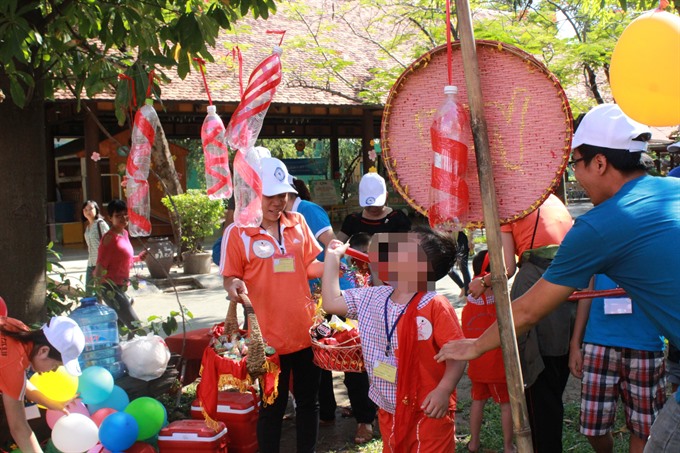 Society
Society

Vocational training and occupational counselling for people with autism is needed to help them live independently and better integrate into society, experts said.
 |
| Child with autism plays at a friendly sports programme held last year. — VNS Photo Ngô Đồng |
HCM CITY — Vocational training and occupational counselling for people with autism is needed to help them live independently and better integrate into society, experts said.
At an ASEAN policy workshop held last Saturday in HCM City, Dr Nguyễn Xuân Thắng, director of the Centre for Rehabilitation and Support Children With Disabilities in the city, said that this kind of counselling is lacking in Việt Nam.
Only a few establishments, most of them set up by parents of children with autism, are providing vocational training and occupational counselling, Thắng said.
Students at Tuổi Ngọc Specialised School in the city’s Bình Thạnh District, for instance, are taught how to make handicraft products, such as key rings, bracelets and postcards. They also learn to weave handbags, along with cooking and making cakes.
According to Phạm Thị Kim Tâm, founder of the Tuổi Ngọc Specialised School, people with autism can work in restaurants, coffee shops, hotels and supermarkets. Computer game testing could also be suitable for people with autism, Tâm said.
Phạm Thị Yến, deputy director of the Albert Einstein Centre in Hà Nội, says people with autism can also work in office jobs, doing simple work that does not require a high level of skills because their capacity for concentration is limited.
They also find it difficult to sit for a long time. Moreover, their eye-hand co-ordination is not good, leading to slowness and inexactitude in working and they need supervisors to assist them, she said, adding that it is difficult for them to get jobs.
The number of enterprises recruiting people with autism is very low, Yến said.
A mother of a 14-year-old boy from Hải Phòng City told Việt Nam News that like every other mother, she wants her son to get a job when he grows up. However, it is difficult. “Children with autism need more time for learning than other children,” she said.
Low awareness
They need people to have a deep understanding about their capacity to work, but community awareness about them remains low, she added.
Thắng of the Centre for Rehabilitation and Support Children With Disabilities said he plans to provide occupational counselling and vocational training for children with autism at the centre in the upcoming time.
The centre will co-operate with other relevant organisations and schools as well as enterprises to carry this out, he added.
Dr Huỳnh Tấn Mẫm said “Before providing occupational counselling and vocational training, children with autism should be taught necessary living skills which are useful for them at work.”
Đoàn Hữu Minh, head of the Social Work Division at Agency of Social Protection, said that the country has more than 200,000 people with autism.
The Government has also amended policies, including building models for establishments to raise and provide assistance to children with autism, Down syndrome, and other disabilities.
In the future, these policies will also be perfected to provide better rehabilitation.
General Directorate of Vocational Training is also learning the demands of autistic people and will set up more programmes suitable for them.
The workshop was held by the Ministry of Labour, Invalids and Social Affairs in co-operation with the Việt Nam Autism Network.
It was a part of the 2nd Việt Nam Autism Awareness Day held on April 1 and 2.
On April 2, more than 600 children with autism and their parents from eight provinces and cities attended friendly sports programmes in which they competed with each other in swimming, running and others sports. — VNS




